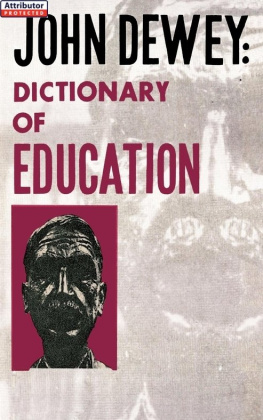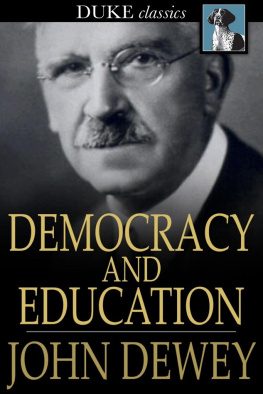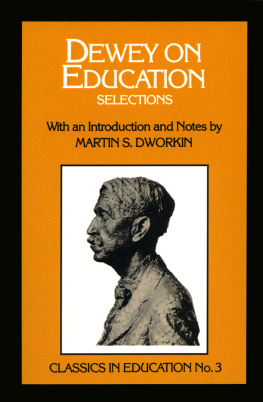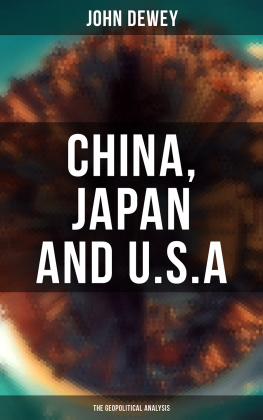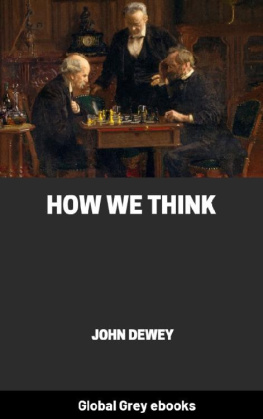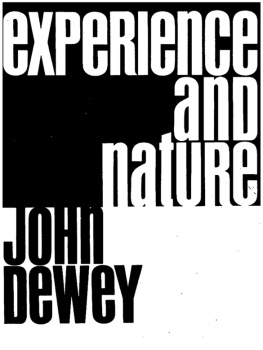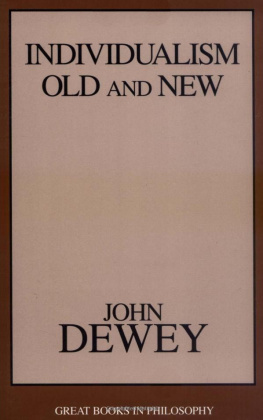Contents
Guide
Pagebreaks of the print version
Americas Public Philosopher
Americas Public Philosopher
Essays on Social Justice, Economics, Education, and the Future of Democracy
John Dewey
Edited and with an introduction by Eric Thomas Weber
Columbia University Press
New York

Columbia University Press
Publishers Since 1893
New YorkChichester, West Sussex
cup.columbia.edu
Copyright 2021 Columbia University Press
All rights reserved
E-ISBN 978-0-231-55288-2
Library of Congress Cataloging-in-Publication Data
Names: Dewey, John, 18591952, author. | Weber, Eric Thomas, editor.
Title: Americas public philosopher : essays on social justice, economics, education, and the future of democracy / John Dewey ; edited and with an introduction by Eric Thomas Weber.
Description: New York : Columbia University Press, [2020] | Includes bibliographical references and index.
Identifiers: LCCN 2020022538 (print) | LCCN 2020022539 (ebook) | ISBN 9780231198943 (hardcover) | ISBN 9780231198950 (trade paperback)
Subjects: LCSH: Philosophy. | Political culture.
Classification: LCC B945.D41 W43 2020 (print) | LCC B945.D41 (ebook) | DDC 191dc23
LC record available at https://lccn.loc.gov/2020022538
LC ebook record available at https://lccn.loc.gov/2020022539
A Columbia University Press E-book.
CUP would be pleased to hear about your reading experience with this e-book at .
Cover image: John Dewey, Everett Collection Inc. / Alamy Stock Photo
Cover design: Chang Jae Lee
Contents
I began working on this collection of John Deweys public writings in 2011. Along the way, many people were essential in the development of this project. At the time, I was teaching at the University of Mississippi, in which my department chair, Dr. Robert Haws was immensely supportive. I am also grateful to Dr. Doug Sullivan-Gonzalez, dean of the Sally McDonnell Barksdale Honors College at the University of Mississippi, for the support that work with his college provided me over the years. Those funds enabled me to hire two undergraduate research assistants, Christine Dickason and Elizabeth Lococo, who deserve key thanks for their work on this project. By 2013, I had narrowed my selections down to just over sixty essays from Deweys vast corpus as candidates for inclusion in this volume. The following year, I enlisted Christines and Elizabeths help as they were two of the most talented undergraduate students I have had the privilege to hire as research assistants. They read through all of the essays that I had selected, letting me know which they found to be the most compelling, where they found matters to be needing more introduction or prefacing, and more. Their thoughts on the initial selection of essays enabled me to trim the collection down to the most powerful and timely essays for readers today. Their reactions were invaluable for my editorial work and writing aimed at introducing and explaining the essays included here.
This collection would have been impossible without the mentorship that I was fortunate to receive from Dr. Larry A. Hickman, former director of the Center for Dewey Studies and professor emeritus at Southern Illinois University Carbondale, in Carbondale, IL. Furthermore, I am one of the lucky few to have more than one mentor. Dr. John Lachs of Vanderbilt University has guided me countless times at all stages of my career, including with respect to this project. I am grateful to John and Larry both for being my guiding examples.
Angela Moore-Swafford of Southern Illinois University Press was supportive and kind in the process of checking and procuring the permissions to republish Deweys essays included in this volume. I am thankful to her and to SIUs board of trustees for permission to use Deweys essays, as well as for Angelas help and support.
Dr. Tibor Solymosi has long been a good friend and colleague and for this volume generously offered me editorial feedback on my selections and introductions to the essays. The collection is significantly stronger than it would have been without his help. I am also grateful to the blind reviewers whose feedback helped me to strengthen the organization of these essays.
My colleagues in the Department of Educational Policy Studies and Evaluation in the University of Kentuckys College of Education have been a great source of support and encouragement as well. I am grateful to my colleague Dr. Beth Goldstein, who advised me on matters relating to the publication of this collection. Dr. Kelly Bradley has been an ideal department chair, and her encouragement has meant a great deal to me. Dr. John Thelin, my senior faculty mentor in the department, is an exemplar of the publicly engaged scholar whom I hope to emulate. In addition, I am excited that my colleges new dean, Dr. Julian Vasquez Heilig, has shown already both in words and deeds, in his career and here in our college, that he champions publicly engaged scholarship, the kind of spirit which animates this volume.
I also owe thanks to John W. Wright, of the John W. Wright Literary Agency, who encouraged me to submit this project to Columbia University Press. My editor, Wendy Lochner, of the press has been wonderful to work with and has been understanding and supportive at every step.
Without question, I am most grateful to my family, especially to my brilliant wife, Dr. Annie Davis Weber, who has been my strongest supporter. My parents, Drs. Collin and Dominique Weber, have also been proud of my work in philosophy from the beginning. And my in-laws, Dr. Paul and Jane Davis, have been kind and supportive at every turn. I am truly, deeply fortunate and am grateful to each of these people and many more beyond them.
In the spirit of John Dewey, I must thank all of the many students I have worked with, who have inspired me with their thoughts and questions throughout nearly two decades of teaching in higher education. I hope that this collection of essays honors all that these many people have taught me and shares with others the inspiration that drew me in to philosophy and its dialogue with life and policy.
I t is hard to find a basis for hope in the world today. Gains in the struggle for womens historic equality are eroded when politicians demeaning stances toward women and dismissal of their testimony about sexual assault become commonplace and accepted.
Americans today desperately need guidance in intellectual and moral leadership. As I hope that this book will make clear, John Dewey was an exemplary public philosopher who sought to provide Americans and lovers of democracy around the world with a vision for living intelligently and creatively together. Deweys work can help us find a basis for hope about democracy and education even in troubled times. Dewey did not have all the answers, but he offered a crucial democratic attitude and outlook, rooted in a cautious but reasoned faith in human potential. That faith was not nave. Dewey was born in 1859, just two years before the start of the American Civil War. His lifetime spanned the period of the dissemination and explosion of Darwins influence on the biological and social sciences, two world wars, the Great Depression, and the lead-up to McCarthyism. Deweys life of ninety-two years, ending in 1952, witnessed the arguments for different approaches to the still new universal public education, including the debates about what schools are for. He was an advocate for womens suffrage and democratic equality. He called attention, furthermore, to the contradictions in Americans criticisms of Germanys prejudices and iniquities while people in the United States were committing injustices against women and black, Asian, and Jewish Americans at the same time. Dewey challenged the growing nationalism, isolationism, and anti-immigrant sentiment of his time, all while resisting the idea that the United States was the worlds police officer.


